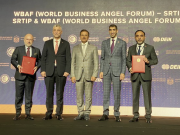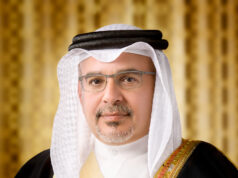 Co-President of the World Entrepreneurship Forum,
Co-President of the World Entrepreneurship Forum,
CEO of Solstar International Pte Ltd and Chairman of
NTUitive, Inderjit Singh, says exciting times are ahead
for South East Asia, as angel investors show more and
more interest in developing a healthy and sustainable
entrepreneurship environment.
The start-up scene in South East Asia (SEA) has been developing for the last 15 years, starting with Singapore where, through government support, a serious effort was put in place to transform the entrepreneurship landscape. Most of SEA only began actively participating in the angel investors’ community in the last 5 years.
The Singapore Experience
In Singapore, the government formed the Action Community of Entrepreneurship (ACE), which was the catalyst for the entrepreneurship spirit that developed in this region. ACE, formed in 2003, focused on a number of initiatives to create a dynamic start-up ecosystem in Singapore.
The transformed entrepreneurship landscape in Singapore was mostly due to the initiatives ACE helped put in place, including changing rules and regulations, tweaking the education system to create a culture of enterprise and innovation, and putting in place many new financing options that were grossly lacking in Singapore.
In the area of financing start-ups, ACE started with the Technopreneurship 21 Initiative (T21), a joint effort headed by various government and private agencies to promote technopreneurship in Singapore, promoting the translation of R&D into businesses. Through a US$1 billion Technopreneurship Investment Fund, we mobilized the Singapore venture capital industry and seeded many promising business ideas. The success of this attracted many more VCs to set up shop in Singapore and many of these VCs today are funding start-ups around the region, including South East Asia.
Since 2004, through ACE, there have been many more financing instruments put in place to help support start-ups from inception through their growth stages. Spring SEEDs is a fund managed by the government that will match $2 for $1 of investment made by an angel investor in a start-up that is less than 3 years old. This, therefore, multiplies the angel money quite significantly. There is also another scheme called the Angel Investors Tax Deduction (AITD) Scheme, where pre-qualified angel investors can deduct 50% of their investment amount from their personal income tax. Through government support, today the start-up financing environment in Singapore is quite vibrant.
More importantly, the active financing environment in Singapore has been able to support start-ups in South East Asia. Many of the VCs that were started in Singapore since 1999, are actively investing in many start-ups in the region today. Some of the more prominent start-ups in Indonesia and Malaysia are funded by angels and VCs that have a significant presence in Singapore.
The Emergence of Angel Investors Clubs in SEA
With the success seen in Singapore, we are starting to see a number of angel investment initiatives developing in South East Asia; the investment environment is heating up and this has lead to a number of angel investment clubs being formed. Singapore saw the first successful effort in the creation of such investment clubs like the Band of Angels, the oldest seed funding organization in Silicon Valley. Business Angel Network South East Asia (BANSEA) was formed in 2001. BANSEA not only actively helps match early stage companies with angel investors, but the organization also creates connections for their investee companies, with angel groups around the world, including the USA, China, India, Europe and of course South East Asia. They conduct educational conferences, workshops, networking and research.
Some 11 years later, in 2012, the Angel Investment Network Indonesia (ANGIN) was formed. ANGIN is an exclusive group of angel investors focusing on early stage companies. Investors offer mentoring services to investees. In addition to technology/ Internet, consumer products/services, social enterprises, ANGIN also created the Women’s Fund, a special program that supports and empowers women entrepreneurs.
Angels Den, which is well-known around the world, expanded into Singapore in 2010 and to Malaysia in 2011. Providing investment matching and mentorship, they also manage a crowdfunding platform bringing investors and businessmen to investment in small and mediumsized enterprises. They offer funding clinics where founders get to present their ideas through one-on-one elevator pitches to potential investors.
Established at the end of 2013, ManilaAngels is a Philippines-based private network of angel investors. They organize networking and investment sessions focused on high technology companies. They run events like Angel Dinners where founders send in threeminute video pitches to potential angels earlier in the day and then these are assessed and the top four videos that get the highest scores have the opportunity to present their ideas to angels at this event. Recently 1000 Angels has also been active in the Philippines.
With a presence in more than 50 countries, Start-up Angels set up residence in Thailand, where they hold workshops and summits exploring the latest trends in investing and cultivate networks of investors and facilitate the introduction of angels to start-ups.
Malaysian Business Angels Network (MBAN) was established in May 2012. MBAN is the official trade association and governing body for angel investors and angel clubs in Malaysia. MBAN aims to create a responsive angel ecosystem for start-ups. MBAN also does accreditation of individual angel investors and angel investors clubs. Other activities include the quarterly angles, sourcing and managing deal flows, networking sessions and advocacy to help shape better policies for entrepreneurship development.
In 2012, HATCH! was established in Vietnam, to promote effective entrepreneurship. Today they focus on helping build a entrepreneurship environment for co-working spaces and incubation programmes.
Bangkok Venture Club started in 2014, bringing together successful investors, business leaders and entrepreneurs in Thailand and Southeast Asia. Their aim is to identify and support early stage companies through investment, networking and guidance by mentors.
The Future
It is promising to see less developed SEA countries catching up in the area of angel investing. Myanmar has the Yangon Angels, and Cambodia has the Cambodia Investors Corporation and with greater cooperation among SEA countries, especially through ASEAN, we will see the start-up ecosystem becoming much more active in the coming years.
In November 2016, some of these SEA angel associations got together to form the ASEAN Angel Alliance (AAA). AAA aims to increase cooperation among ASEAN angel communities, to share best practices and to facilitate cross-border investments. It will be interesting to see how the South East Asia investment scene, and all these angel groups, mature and support entrepreneurs in a region that is home to more than 500 million people.


























